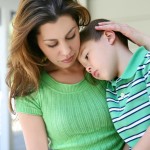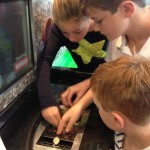Talking With and Supporting Your Children After Sandy Hook
 As much as I would like it if my children never heard about the shooting in Newtown, they don’t live in a bubble. Ultimately, they will hear about it on the news, from their friends or social media. Better it come from me. I just my told kids. Sadly, but not surprisingly, they ended up comforting me.
As much as I would like it if my children never heard about the shooting in Newtown, they don’t live in a bubble. Ultimately, they will hear about it on the news, from their friends or social media. Better it come from me. I just my told kids. Sadly, but not surprisingly, they ended up comforting me.
Some things to remember when discussing violence, such as this, with your kids:
- Nothing you say is going to protect them from something like this, so the pressure is off. Unlike speaking to them about abductions, where you have the feeling it can be prevented, you can’t get this wrong. Remember the only reason you are telling them is so they hear it in a comfortable setting, from someone who cares about them.
- Start slow. Be very general, and give them the information in doses they can handle.
- Sit close. Be ready to lean in for a hug, hold their hand or let them lie on your lap. Kids may initially get a feeling very unfamiliar to them – vulnerability. It is important for them to know they are loved, and that there are many adults who are dedicated to keeping them safe – parents, family, police, armed forces, etc.
- Be honest (kids respond to honesty), but watch out when expressing anger. Yes, we are all infuriated by the senselessness of this tragedy, but let your kids have their own reaction. Don’t expect anything – they may ignore you, cry, giggle, scream, have a million questions, have no questions. Any reaction is normal. Remember, you don’t even understand what you’re feeling right now, and you are the grown up. Don’t pressure them to feel a certain way.
- Answer only the questions they ask. Don’t try to make sense out of it for them. Just let them know you are available for any questions or discussion at any time.
My thoughts and prayers, like yours, go out to the victims, their families, the first responders and the town of Newtown.
 Ridgewood Schools Superintendent, Dr. Daniel Fishbien, also gives some advice on helping children cope:
Ridgewood Schools Superintendent, Dr. Daniel Fishbien, also gives some advice on helping children cope:
Here are some helpful things to think about:
Don’t project your fears onto your children
Kids pay close attention to the adults in their life, following their cues and listening closely to what adults are saying. Although it is overwhelming to think about this tragedy occurring in your community–happening to your children–pay close attention to what you’re saying and how you are responding. Children do not respond to death, tragedy, and grief the same way adults do. They process and understand events like these differently from adults. Fearing for your children’s and community’s safety is a normal reaction, but saying things to your child that increase their fear is seldom helpful and does not increase their preparedness for tragedy. Projecting angst on children does not provide them with tools for being safe, it merely creates fear, which can make them feel all the more powerless in times like these.
Limit access to the repetitious news cycle
The news functions in cycles, and its objective is not concise facts and information for the viewership. It is repetitious and goes on for many days after a tragedy. It is not helpful for a child to watch long segments, filled with graphic narratives about the events or the fear survivors and community members experienced. Pay attention to the television, radio, and Facebook. Even if the tv is on in the background, children are listening to what is being said. Consider getting out of the house and taking a break from social-media and the television.
We can’t protect our children from knowing about tragic events
The fact of the matter is tragic gun violence has become a new norm for our children. The events may be preventable in the future, but for now it is becoming a common occurrence. Locking our children in their rooms until the news cycles change is not helpful. Talking openly and honestly, preparing them for the conversations they’ll have with their friends on Monday, is important. Being honest if crucial.
Listen
Although children may ask difficult questions, listen and answer their questions honestly. As adults, there are many things we don’t understand. It is okay to say “I don’t know.” In fact, admitting that we don’t know may be more helpful and comforting than reaching for clichés or making up answers. Acts like the ones committed in Sandy Hook are more complex than attributing them to “evil” and “monsters.” No doubt the killers actions were evil and monstrous, but most children want more thoughtful responses to help them understand. There is not much children can comprehend with the idea of people being monsters. They understand that some people can be mean or hurtful, but euphemisms seldom fulfill their questions.
It is important and empowering to give a child or teen the space to express all of their feelings and asking them what they think. Asking them how they feel about the events provides them an opportunity to explore what this means to them.
What do we tell the children?
Honesty is important and so too is entering these conversations without expectations. Some kids may respond with fear while others may seem indifferent. No reaction is better or more appropriate than another. Getting back to the e-mail I received this morning from a Good Grief mom, having a conversation about the shooting this weekend is probably a smart and important thing to do before school on Monday. Classmates will have their own interpretation of the events; many of those narratives will have been learned this weekend from the media and the adults in their lives. Again, there is not a lot we control about these events, but we can play a big role in how our children hear and come to understand the events. We can best support our children by having an honest dialogue that helps build coping skills and taps into their inherent resiliency. Below is a script you might try.
Adult: So, Alex, have you heard about the sad thing that happened to a school in Connecticut?
Don’t assume Alex doesn’t already know. She may have picked it up already.
Adult: Somebody hurt a lot of children with a gun. It’s very sad. Children died.
WAIT to see how the child responds.
Adult: I think a lot of your friends and teachers will be talking about it on Monday. I would like us to talk about it too.
Allow the conversation to happen and be spontaneous. Here are some things you should know about reactions:
- No child ever responds the same
- Children may have an increased sense of fear for their safety
- Children may be afraid to return to school or name “scary kids” in their school
- Child process information is fragments. They may take it in and then quickly move onto something else.
Adult: I wonder how these things happen.
Wait to see if the child has ideas of her own.
Adult: Assure the child that their school (name administrators and teachers) works hard to keep them safe. You can encourage them to listen to their teachers about safety protocol. Assure them of your love and allow them to explore their reactions.
Often times, being together and offering each other love are the most meaningful things we can tell our children.
As a community, we both grieve for those affected by tragedy and hold hope that when one of us suffers, all of us come together to find a new way forward.




















